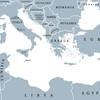General Maritime Corporation has signed two-year time charter contracts, with a trading company, for up to nine of its Aframax OBO Vessels (combination vessels which can perform both wet and dry trades). The initial time charter contracts are for four of the Company's Aframax OBO vessels. The contracts for the four vessels will provide net voyage revenue to General Maritime in the first year of approximately $28 million, and could provide an additional $28 million in the second year through the exercising of the charterer's option. If the charterer does not exercise the option, General Maritime has the option to extend the time charter for an additional year, which would generate net voyage revenue of approximately $22.5 million. The time charters for these four vessels will commence upon delivery of the vessels, which will be staggered between the end of September and mid-November 2003.
The charterer has the option to time charter three additional Aframax OBO vessels for one year. If this option is exercised, the charterer will have another option to time charter two additional Aframax OBO vessels for one year. The exercise of all these five options would provide the company additional net voyage revenue of approximately $35.0 million, for total fixed net voyage revenue of approximately $63 million in year one. The options for the additional five vessels must be exercised by the second half of November 2003. These time charters may be extended for an additional year on similar terms to those for the first four vessels. All of the vessels are expected to be used in both the "wet" and "dry" trade. Peter C. Georgiopoulos, Chairman, Chief Executive Officer and President, commented, "As a result of the recent upturn in the dry cargo market we have found a unique opportunity to charter these specialized vessels at rates above what standard double-hull Aframax vessels can earn. We are extremely pleased to have signed these contracts at very profitable rates and provide our shareholders with an increased amount of secured revenue. These new contracts underscore General Maritime's disciplined approach to managing its fleet deployment. We will continue to operate the majority of our vessels in the spot market to take advantage of strong rate environments as we have done in 2003, while looking for opportunities to sign time charters that both meet our rate requirements and provide downside protection."
Including the four new time charters, General Maritime currently has 11 of its 46 vessels, or 24 percent of its fleet, on time charter contracts. If the charterer exercises the option on the additional five vessels, General Maritime would have 31 percent of its fleet on long-term charters.
Sponsored Content
MSC Sets a New Standard for Time Off in 2025, Plus Earn a $38,340 Bonus as an Able Seaman!

April 2025
 Read the Magazine
Read the Magazine

 Read the Magazine
Read the Magazine
This issue sponsored by:

Saltchuk Doubles Down on Workforce Development Investments
Subscribe for
Maritime Reporter E-News
Maritime Reporter E-News is the maritime industry's largest circulation and most authoritative ENews Service, delivered to your Email five times per week







